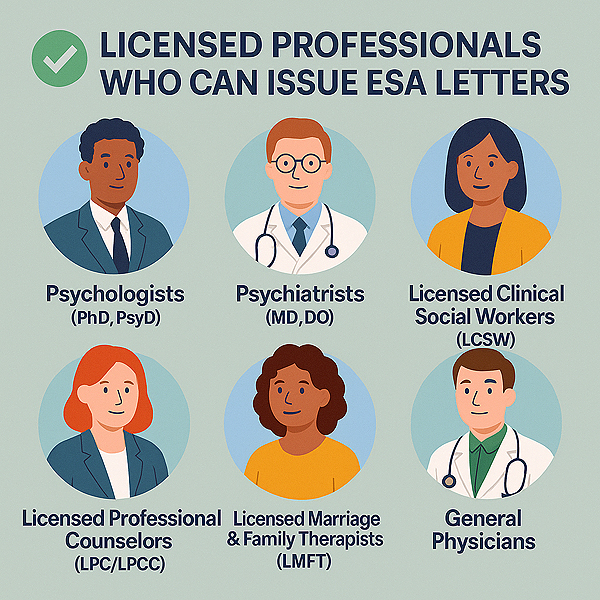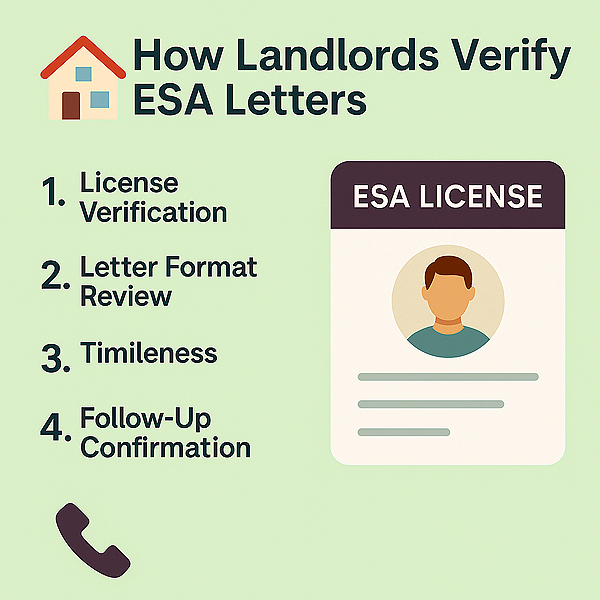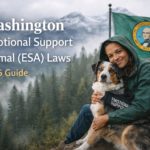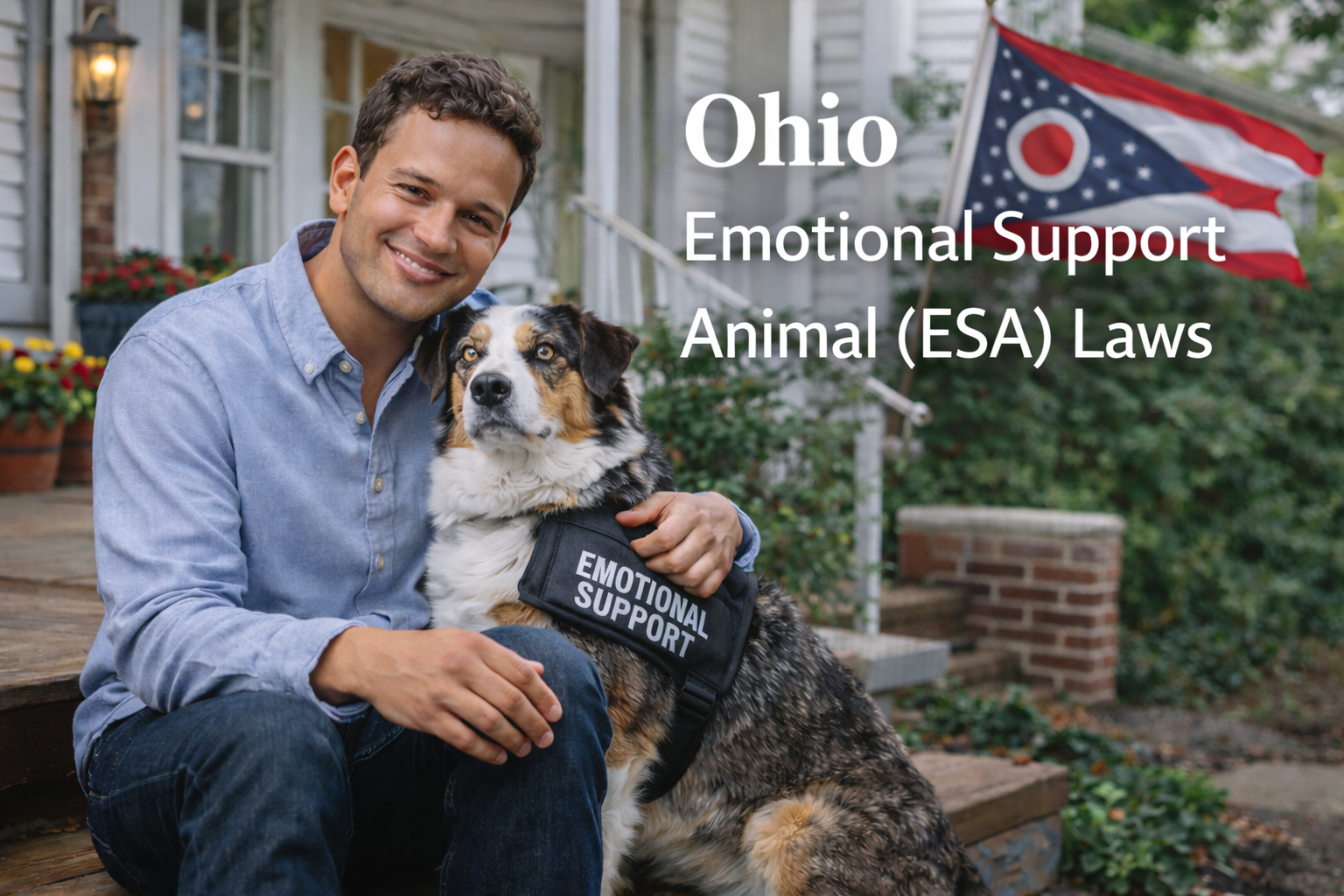Who Can Write a Legitimate ESA Letter?

If you’re considering an Emotional Support Animal (ESA) to help with anxiety, depression, PTSD, or other challenges, the first step is securing a valid ESA letter. This is the one document that transforms your pet into a recognized ESA under the Fair Housing Act (FHA), giving you protections against no-pet housing rules and pet fees.
But here’s the problem: while many websites promise “instant ESA letters,” most don’t hold up when landlords, property managers, or campus housing offices check them. Submitting the wrong type of letter could mean rejection, disputes, or even losing your housing.
So, who can actually write a legitimate ESA letter?
In this guide, we’ll cover everything you need to know, including:
- ✅ Which licensed providers can issue ESA letters
- ✅ Which providers cannot write valid letters
- ✅ How landlords verify ESA letters
- ✅ State rules that add extra requirements
- ✅ Red flags for fake ESA letters
- ✅ Real case examples of approvals and denials
- ✅ A step-by-step checklist for getting a valid ESA letter
✅ Licensed Professionals Who Can Issue ESA Letters
By law, only licensed professionals in mental health or medicine, and general physicians can issue ESA letters that qualify under the FHA.
Mental Health Providers (Most Common)
- ? Psychologists (PhD, PsyD)
Qualified to diagnose and treat mental health conditions. They can recommend an ESA as part of therapy. - ? Psychiatrists (MD, DO)
Medical doctors specializing in psychiatry. They can prescribe medication, provide therapy, and issue ESA letters. - ?⚕️ Licensed Clinical Social Workers (LCSW)
Therapists who diagnose and treat mental/emotional conditions, often through counseling. - ? Licensed Professional Counselors (LPC/LPCC)
State-licensed providers trained in emotional and mental health support. - ? Licensed Marriage & Family Therapists (LMFT)
Specialize in family and relationship therapy but can also provide ESA evaluations when appropriate.
General Physicians (Sometimes)
Some primary care doctors (MDs/DOs) are technically allowed to issue ESA letters since they are licensed medical professionals. However, this option is becoming less common:
- Many don’t feel comfortable making a mental health evaluation.
- Some don’t want to be involved in housing disputes.
- Large health systems may prohibit their doctors from issuing ESA letters altogether.
? While a general physician can write one, most valid ESA letters come from mental health specialists.
? Who Cannot Write a Valid ESA Letter
The following do not qualify:
- ❌ Veterinarians
- ❌ Chiropractors, naturopaths, or holistic healers
- ❌ Life coaches, wellness coaches, or unlicensed “therapists”
- ❌ Websites offering instant approvals with no evaluation
If your landlord can’t verify a licensed provider’s credentials, your letter can (and likely will) be rejected.
? Why Many Providers Won’t Write ESA Letters
Even among licensed professionals, fewer practitioners are issuing ESA letters today. Why?
- Health networks restrict them. Many large healthcare systems (and insurance-based providers) have policies against writing ESA letters due to liability concerns.
- Time and compensation. Insurance-covered visits don’t always reimburse providers for additional documentation.
- Fear of abuse. Providers worry about being linked to fraudulent or “pet loophole” requests.
This leaves many patients with legitimate needs unable to get documentation from their regular provider.
? That’s why online platforms like NSAR are more important than ever. NSAR connects clients with licensed mental health professionals who are available to conduct proper evaluations and issue ESA letters that landlords trust (and verify the letter swiftly and easily).
? How Landlords Verify ESA Letters
Because fake ESA letters are so common, landlords know how to spot them. Here’s what usually happens when you turn in your documentation:

1. License Verification
Your landlord checks the provider’s:
- Full name and professional title (LPC, LCSW, MD, etc.)
- License number
- State of issuance
- Expiration date
? Most states have public license lookup databases, allowing landlords to confirm credentials in minutes.
2. Letter Format Review
They’ll check if your letter is:
- On official letterhead
- Signed and dated (within the last 12 months)
- Contains the provider’s contact information
- Clearly states that your animal provides emotional support for a mental/emotional condition
If the letter looks generic or incomplete, it’s a red flag.
3. Timeliness
Even valid letters may be denied if outdated. Most landlords require a letter that’s less than one year old.
4. Follow-Up Confirmation
Some landlords contact the provider’s office directly. Importantly:
- They cannot ask about your diagnosis.
- They can only confirm that the provider issued the letter and is licensed.
Example:
Emily submitted a letter from her therapist. Her landlord checked the license online and approved her ESA within a day. Her neighbor, however, used a $49 “instant ESA site” that provided no license details. It was denied immediately.
⚖️ State Rules You Should Know
While the FHA applies nationwide, several states add their own rules:
- California → Requires a 30-day relationship with the provider (in-person or telehealth) before a letter is valid.
- Florida → Misrepresenting a pet as an ESA or using a fraudulent letter can lead to criminal penalties.
- Colorado → Allows landlords to reject unverifiable letters and requires clear license info.
- Texas → Landlords may request verification of license details, but cannot demand diagnosis specifics.
- Illinois & New York → Strongly encourage landlords to confirm license status before accepting a letter.
? Always confirm your provider is licensed in your state.
? Red Flags for Fake ESA Letters
Be cautious of:
- “Instant approval” promises with no evaluation
- Missing provider name, license number, or contact info
- Claims of public access rights (ESAs don’t have ADA public access)
- Poor formatting or copy-paste templates
? Real Case Studies
Case 1: The Denial
Sarah used a letter from an “instant approval” site signed by a “wellness coach.” Her landlord denied it, and she almost lost her lease.
Case 2: The Approval
James, a veteran with PTSD, received his ESA letter from a licensed psychologist. The letter included license details and contact info. His landlord verified it within minutes, and approval went through smoothly.
Case 3: The Dorm Dispute
Emily, a student, submitted a letter from a provider not licensed in her state. Housing rejected it. Once she worked with an in-state LPC, her ESA cat was approved for her dorm.
? How to Get a Valid ESA Letter (Step-by-Step)
- Choose the Right Provider – Licensed mental health professional (or in some cases, a physician).
- Schedule an Evaluation – In person or via telehealth.
- Receive Your Letter – Should include provider credentials, date, and signature.
- Submit It to Housing – Provide a copy to your landlord or housing office.
- Renew Annually – Keep your letter up to date.
✅ ESA Letter Checklist
A valid ESA letter must include:
- Issued by a licensed provider (LPC, LCSW, Psychologist, Psychiatrist, etc.)
- Provider’s license number and state
- Provider’s contact information
- Signed and dated (within the last 12 months)
- Statement confirming your animal provides emotional support
? The Future of ESA Letters
The demand for ESAs has grown significantly in recent years, especially during and after the pandemic. As demand rises:
- States are creating stricter rules to combat fraud.
- Landlords are using license verification tools more frequently.
- Healthcare networks are limiting who can issue letters.
That’s why trusted platforms like NSAR have become essential. By connecting individuals to licensed professionals specifically available for ESA evaluations, NSAR ensures letters are legitimate, verifiable, and recognized by housing providers.
? The Bottom Line
Only licensed professionals can issue legitimate ESA letters. While general physicians may sometimes provide them, most are issued by psychologists, psychiatrists, counselors, or social workers.
But with many large providers refusing to write them, more people are turning to NSAR for access to licensed professionals who know the process and issue letters landlords trust.
? Don’t risk rejection or disputes. Get your ESA letter through NSAR and protect your housing rights today.

















































































